The Elysée Treaty, which laid the foundations for Franco-German cooperation after the Second World War, was signed on 22nd January 1963 by French premier Charles de Gaulle and West German Chancellor Konrad Adenauer. The treaty’s provisions were a major contribution to the continent being led jointly and in close symbiosis by two of the EU’s largest countries, which saw themselves as the driving force behind European integration. France provided the security and the German economy financed the peace project of the integration. To put it more simply, the EU was built on French self-consciousness and German guilt.
This division of roles worked quite well, but the Russian-Ukrainian war has opened up tensions that had been previously obscured by the cordiality of the two great powers.
An obvious sign was the way the joint government meeting at the end of October was moved to the anniversary date. Geopolitics, defense policy and energy are the main conflicted points.
Zeitenwände – Germany’s Changing Defense Policy
In his speech to the German parliament at the end of February, German Chancellor Olaf Scholz announced the end of the German foreign policy doctrine. An integral part of German foreign policy was Ostpolitik, which meant the governance of the relationship with the Soviet Union and the Communist bloc, and later with Russia, which had essentially been in place since the term of office of Social Democrat Chancellor Willy Brandt. This clearly ended on February 24th 2022. Putin’s attack on Ukraine also shattered the fruitful German-Russian economic trade relations.
“[That date] marks a watershed in the history of our continent. With the attack on Ukraine, Russian President Putin has started a war of aggression in cold blood” Scholz said.
In practical terms, this meant that Germany in the European Union no longer stood up for Russia, and at the same time the previously frosty German-Polish and Baltic relations began to thaw. At the core of the conflict was Germany’s over-dependence on Russian energy. After the Russian attack in February, the German political elite was forced to admit that Polish and Baltic politicians were right about the Russian threat.
Since the 1950s, a lesser-known but more influential organization has lobbied for closer ties with Russian markets: the so-called Ost-Ausschuss, or Committee of the East. The annexation of Crimea and the conflict in Eastern Ukraine led the West to impose sanctions, which also affected German companies. The Committee, of course, did not agree with Russia’s punishment (and the loss of their profits), and lobbied against lifting the sanctions all along.
For Germany, until this year’s Russian invasion, cheap Russian gas was more important than regulating Putin.
Moscow had allies such as Putin’s personal friend Gerhard Schröder, Angela Merkel’s predecessor as Chancellor. Schröder, as head of the Nord Stream 1 project company, lobbied heavily for Russia during Merkel’s terms. In this work, he could count on former SPD party colleagues such as then-foreign policy minister Frank-Walter Steinmeier and former Vice Chancellor Sigmar Gabriel.
In his speech, Scholz referred to a Zeitenwände, a fundamental shift in the foreign relations. He sees new powers such as China emerging in this new multipolar world, with different states and regimes competing for “power and influence”.

German Chancellor Olaf Scholz greated by Chinese premier Xi Jinping in Beijing on November 4th 2022. (Photo: Bundesregierung / Imo)
“We Germans are taking on the role of guarantors of European security – and our allies expect us to do so. On the other hand, Germany is an advocate of multilateral solutions to global problems,” Scholz elaborated.
He sees this turning point as going beyond the war in Ukraine and even beyond the question of European security: how we Europeans can, and how the European Union can, remain an independent actor in a world of many players.
In the past, Germany has consistently delayed hiking defense spending. Berlin has thus made the US feel responsible for defending its European allies. Berlin is now committed to meeting the criteria for NATO members, such as raising defense spending from the current 1.4 per cent of its Gross Domestic Product to 2 per cent.
Despite traditional German pacifism, Olaf Scholz has also announced that €100 billion will be spent to arm the chronically underfunded Bundeswehr, the German army.
The Scholz cabinet, after much reluctance and coalition wrangling, was perhaps the last of the European powers to send Ukraine, among other things, tanks, anti-aircraft equipment, anti-tank grenades and rocket launchers. The German government has disbursed €1.20 billion ($1.16 billion) military aid to Ukraine, including weapons and equipment, as well as financial support for military purposes.
In terms of absolute spending, Germany is ahead of France, but behind both the UK and Poland. And in terms of aid as a percentage of GDP, it is pretty much at the bottom.
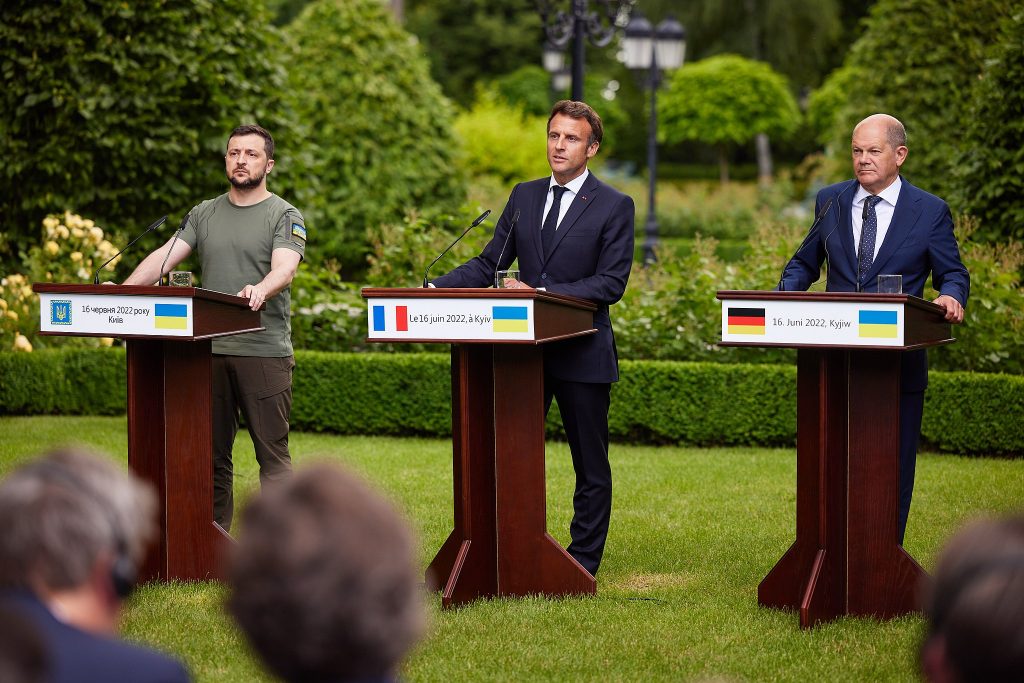
Macron, Ukrainian President Volodymyr Zelenskyy and German Chancellor Olaf Scholz in Kyiv in 2022. (Photo: President.gov.ua, CC BY 4.0, via Wikimedia Commons)
End of Strategic Autonomy?
France is also rather rhetorically strong when it comes to aid volumes. Its military aid to Kiev barely makes the list, amounting to €233 million, ranking behind Estonia. Britain has trained 5,000 Ukrainian soldiers, while France has only 200.
Macron also published his ideas for a common defense policy shortly after the war broke out:
“We can no longer depend on others to feed us, care for us, inform us, finance us,” Macron said. He added: “To this brutal return of tragedy in history, we must respond with historic decisions.”
The French president also announced a European action in the field of armaments and defense. The European Commission has also presented a proposal to coordinate military spending by EU Member States. The Commission proposes €500 million over two years to support joint arms procurement.
Paris welcomed the German pledge to spend more on defense, but was disappointed when Berlin turned to the US for military equipment and to procure F-35 fighter jets from Washington rather than the European (and in particular French) military industry. It had been customary in the past to discuss such strategic security and defense policy issues with the most trusted and partner country.
It is symbolic, however, why Germany is opting for the F-35 instead of the fighters produced in the FCAS project with the French and Spanish. The FCAS, or Future Combat Air System, has faced delays and difficulties for years. The first models of the fighter aircraft produced in the project are not expected before 2040, thanks to disagreements between the French and German contracting parties over the management of the joint project.
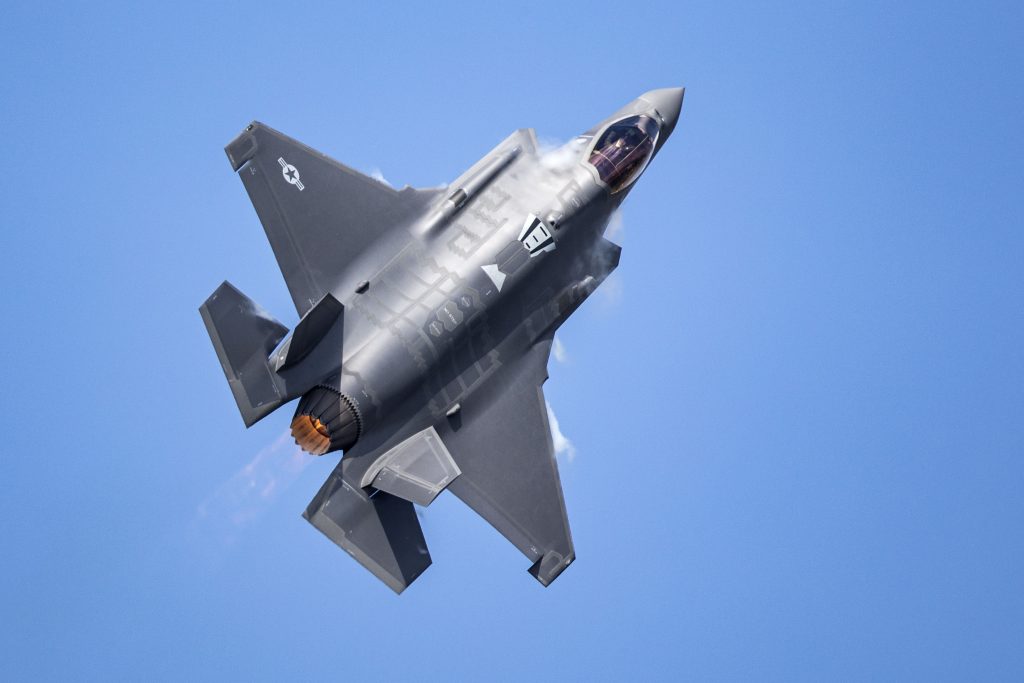
United States Air Force (USAF) F-35A performing a role demonstration during the Royal International Air Tattoo (RIAT) 2018. (Photo: SAC Tim Laurence, OGL v1.0OGL v1.0, via Wikimedia Commons)
Meanwhile, the “European Strategic Autonomy” an ever-so-dear project to President Macron is also in danger of being lost. Neither the Central European countries, nor the Germans look to the French to provide sufficient deterrence in the event of a Russian threat.
Frugal French? Different Ideas on Fiscal and Energy Policies
The Germans have always had a thinly disguised contempt for the French economy, which has been struggling with persistently high deficits and growth problems. And Paris has accused Berlin of hypocritically exploiting its EU dominance, and from time to time has joined forces with Mediterranean partners to try to relax what it sees as overly rigid EU fiscal rules imposed under German pressure. Now the tables seem to be turning: Paris is suspicious of the new debt accumulation policy, which has so far been characterized by sound management and reliability. In response to the energy crisis, the Scholz government has tried to alleviate the energy burden on the population through four different packages of major measures.
The 200 billion economic and 100 billion defense budget packages have ramped up the German budget deficit.
The total German borrowing to make up for the deficit is estimated at €500 billion. This is an almost unfathomable amount, especially when compared to the EU’s Recovery and Resilience Facility (RRF) of almost €700 billion. The economic package has not been an unqualified success in the EU or in France: the €200 billion package, financed by the state not only for the public but also to cover part of the burden on businesses, is allegedly putting German companies at an advantage and distorting EU competition.
Another divisive issue is the peaceful use of nuclear energy: the European Commission earlier this year recognized nuclear power and natural gas as environmentally friendly sources. While France relies entirely on nuclear energy, Germany has notoriously chosen a different path.
German energy policy is mired in a maze of ideology, illusions and lack of imagination. Even in the face of war and energy shortages, the Green Party in particular believes in not giving up the drive to phase out nuclear power, while the majority of Germans are in favour of extending the operating life of nuclear power plants that are still in operation.
There are also differences of opinion on other aspects of the planned Energy Union: France has opted for a submarine pipeline, BarMar, between Barcelona and Marseille, rather than the “Mid Catalonia” LNG pipeline from Spain to France overland, which Germany prefers.
Germany First?
The German chancellor gave another landmark speech in Prague at the end of August, in a manner befitting a self-conscious great power, which openly contradicted the French position on several points.
The German federal government is not enthusiastic about the idea of another pan-European organization (e.g. European Political Community), as the Council of Europe offers a similar, if not almost identical, set of European instruments.
“This is, by the way, also my understanding of Emmanuel Macron’s proposal for a European political community. It goes without saying that we have the Council of Europe, the OSCE, the OECD, the Eastern Partnership, the European Economic Area and NATO. All of these are important forums in which we Europeans are working together closely also beyond the borders of the EU. What is lacking, however, is a regular exchange at the political level – a forum in which we Heads of State and Governments of the EU and our European partners meet once or twice every year to discuss the key issues that affect our continent as a whole, such as security, energy, the climate and connectivity” – stressed Scholz.
While the Chancellor had previously been skeptical about the EU membership of Georgia, Moldova and Ukraine, he has now expressed strong support for it. The German chancellor has stated his belief in the rapid integration of the Western Balkan countries into the EU: “Such a grouping – and it’s very important to me to emphasize this – is not an alternative to the upcoming process of EU enlargement. After all, we have given our accession candidates our word – and, in the case of the countries of the Western Balkans, that was almost 20 years ago. And these words must be followed by deeds at long last.”
Macron has repeatedly tried to present himself as a ‘mediator’ in the Russia-Ukraine conflict, openly saying that Russia should not be humiliated and that Putin should be given an ‘escape route’. The French president has also recently said that “security guarantees” must be given to Russia to bring it back to the negotiating table.
Germany seems unwilling to push Zelenskyy towards making concessions. According to Berlin, it is Ukraine’s decision alone to decide under what conditions it wants to make peace. Any negotiations are based on Russia’s willingness to end the fighting and withdraw its troops from Ukraine.
Despite its significant response to the conflict, Berlin is still not taking the overall leadership role that it should as Europe’s strongest power.
The first step to regaining confidence could be to start tank deliveries to Ukraine. It is impressive how far Germany has come on military issues. However, it still falls short of former Chancellor Angela Merkel’s call to Europe to “take our destiny into our own hands”.
The lack of German leadership is indeed felt in much of Europe and this does not bode well. The lack of German leadership has been exposed and ridden relentlessly and with full force by Russia. Indeed, it was in the light of this that it was revealed that our entire continent is plagued by a lack of ideas and leadership. “Today I fear German power less than German inaction” – a statement made by former Polish Foreign Minister Radosław Sikorski in November 2011. Mr. Sikorski was originally referring to the European debt crisis, but since then has become a catchphrase and seems to be applicable to today’s situation as well.

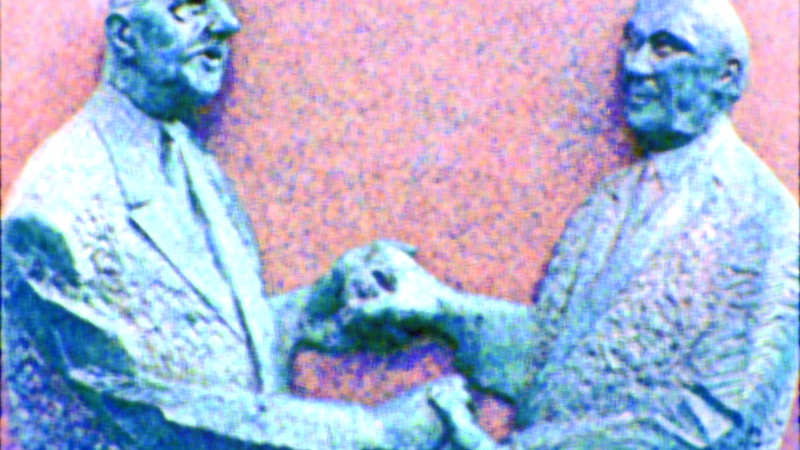
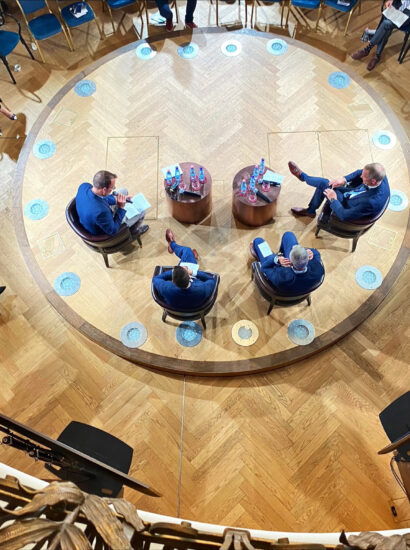
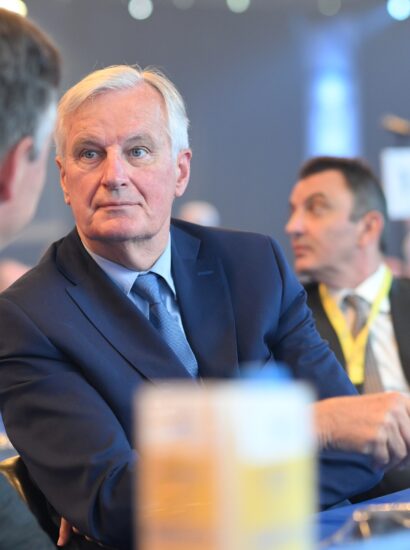
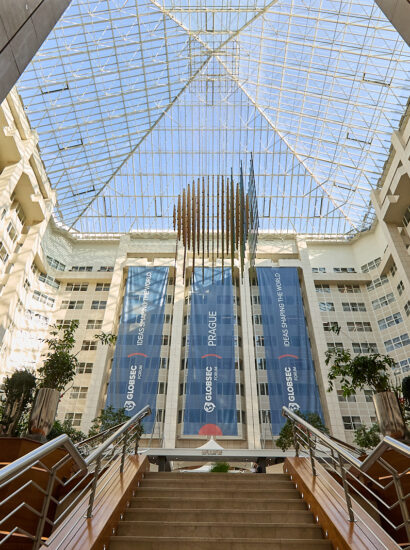

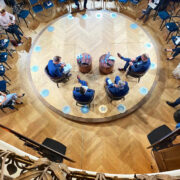

[…] of France, has delivered €566 million. After the Russian invasion German Chancellor, Olaf Scholz committed to a €100 billion spending on the Bundeswehr, as part the major shift in German foreign policy, […]
[…] the ongoing war in Ukraine are the driving force behind European integration, but with the central Franco-German axis losing strength, public opinion is not so enthusiastic about integration. The rise of the […]